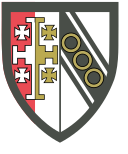Hermes Club
| Selwyn College | |
|---|---|
| University of Cambridge | |
 Selwyn College's Old Court
| |
 Selwyn College heraldic shield
| |
| Location | Grange Road (map) |
| Coordinates | 52°12′03″N 0°06′20″E / 52.20083°N 0.10556°ECoordinates: 52°12′03″N 0°06′20″E / 52.20083°N 0.10556°E |
| Full name | The Master, Fellows, and Scholars of Selwyn College in the University of Cambridge |
| Motto | Ανδρίζεσθε |
| Motto in English | Quit ye like men |
| Established | September 1882 |
| Named for | George Augustus Selwyn |
| Sister college | Keble College, Oxford |
| Master | Roger Mosey |
| Undergraduates | c. 380 |
| Postgraduates | 260 |
| Website |
www |
| JCR |
www-jcr |
| MCR |
www-mcr |
| Boat club |
www |
Selwyn College (formally "The Master, Fellows, and Scholars of Selwyn College in the University of Cambridge") is a constituent college of the University of Cambridge in the United Kingdom. The college was founded by the Selwyn Memorial Committee in memory of George Augustus Selwyn (1809–1878), the first Bishop of New Zealand (1841–1868), and subsequently Bishop of Lichfield (1868–1878). It consists of four main courts built of stone and brick (Old Court, Centre Court, Ann's Court, and Cripps Court) along with several secondary buildings, including adjacent townhouses and lodges serving as student hostels on Grange Road, West Road and Sidgwick Avenue. The college has some 60 Fellows and 110 non-academic staff.
In 2017, Selwyn was ranked ninth on the Tompkins Table of Cambridge colleges in order of undergraduates' performances in examinations, but was first in 2008. In 2006 it had an estimated financial endowment of £75 million, and, in 2018 its fixed assets were more than £110 million. The college was ranked 16th out of 30 in an assessment of college wealth conducted by the student newspaper Varsity in November 2006.
The college was founded following the death of Bishop George Augustus Selwyn on 11 April 1878 who had played an important role in the establishment of New Zealand as its first bishop. George Selwyn was a scholar of St John's College. He was a member of the Cambridge crew which competed in the inaugural Boat Race in 1829. He came out second in the Classical Tripos in 1831, graduating Bachelor of Arts (BA) 1831, Master of Arts (MA Cantab) 1834, and Doctor of Divinity (DD) per lit. reg. 1842, and was a fellow of St John's from 1833 to 1840.
...
Wikipedia
